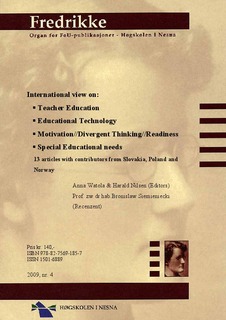International view on: Teacher Education, Educational Technology, Motivation/Divergent Thinking/Readiness, Special Educational needs : 13 articles with contributors from Slovakia, Poland and Norway
Abstract
PART I Programs for Teacher training
Authors from Slovakia underline the commonness between school and society, claiming how cultural changes and new way of life has great impact upon the school system. Accordingly we may agree with the Slovakian author Wiegerowa saying that “The transformation of school system is becoming inseparable part of our life”.
Pressure of changes in school in general attract the role of the teachers, from teacher of subjects to development of teacher´s personality, teachers of subjects to teachers who have the will to non-directive, democratic ways of Education, willingness to heuristic problem solving and willingness to flexible educational and training practice.
One should note well the Slovakian Sirotova and Smetanova who highlight the role of the teacher as follows: “One of the teacher´s task is to create specific conditions that enable students to acquire long-lasting values (in italic by editors) rather than a large amount of information that may quickly be forgotten (…)”. One should give great attention to the conception of “long-lasting values”! Obvious – there is not a matter of values only, accordingly the articles touches what kind of values as well.
PART II ICT in use in Educational contexts
Four authors from Poland and one from Norway give focus on pupils in pre-school and primary school using ICT. A common perspective is quality in advance of quantity, i.e. the conception of learning and the focus on the process from indefinite sources of information to relevant knowledge.
E. Perzycka (Poland) discusses the Computer in use in multimedia education, the computer as a didactic “tool”. She balances the perspective, underlines the positive effect, however making a critical point of view on computer in use.
D. Siemieniecki (Poland) introduces a practical based, so-called “example program” for a computer aided lesson for early schooler creative development. Though she presents separate school subjects, she thinks across subject with the creativity as glue.
D. Moranska (Poland) focuses how ICT can form childrens motivation and disposition for self-development to improve knowledge-based competence. Her perspective reminds us about the Norwegian motto “responsibility for own learning”, a perspective that gives young users feeling of active participation in their educational process.
R. Raska (Poland) introduces a natural pedagogical experiment which was to show an innovative, didactic situation and change in arithmetic knowledge and skills learnt by 1st grade elementary students using computer. In this context she puts into our mind the concept “constructivism” – “the most significant educational trend nowadays”, she says.
H. Nilsen (Norway) gives attention to the new form of exam in Norwegian compulsory school, using ICT to (eventually) receive better marks. In particular he focuses on the heavy process to navigate from a multimodal flood of information to useful, relevant knowledge (“navigating competence”).
Part III Educational issues in general
A. Watola (Poland) presents – as a background – the relevance of school readiness, and how one can diagnose this precondition for doing well in school. The main part of the article presents Watolas own study in the field of readiness. Readers are encouraged to reflect on the relative notion of readiness, asking for readiness in relation to what?
M. Kisiel (Poland) discusses in short form, however very interesting, the term motivation in the educational area, and she raises question among three grade students (9 year old) what is their preferences with respect to music activities and their motivations for studying music in school.
A. Stachura presents an experimental research (small scale form) focusing how divergent tasks of maths extends pupils´ divergent (flexible, added by editor) thinking ability. And, the author refers from his study, “even fluence and flexibility of thinking was improved during the experiment”.
How should the school take care of pupils with special educational needs, is the question articulated of three academics from Slovakia; G. Porubska, D. Mala and V. Gatial. This question is all over of relevance, and highlighted, we may remind, in the new Norwegian school document Knowledge Promotion 2006. The article lists the most common learning disorders, concentration disorders, speech disorders, low intelligence, and sketch out relief effort recommended by psychologists and educational counsellors.
At last from editors:
The articles do not go in depth of research, do not represent basic research. However, we suggest, the articles reveal interesting thinking, in basis (we may claim) cross-cultural thinking as we note three European countries are represented. So – dear readers – of interest in this volume of Fredrikke should be to get a brief, brief look into the sphere of individual thinking; 13 different authors, 13 different interests, 13 different brains with a common fram of reference – school, school equipments, learning, students welfare, students preparation to cope with school challenges and with the real life.
Series
Fredrikkenr 4, 2009
